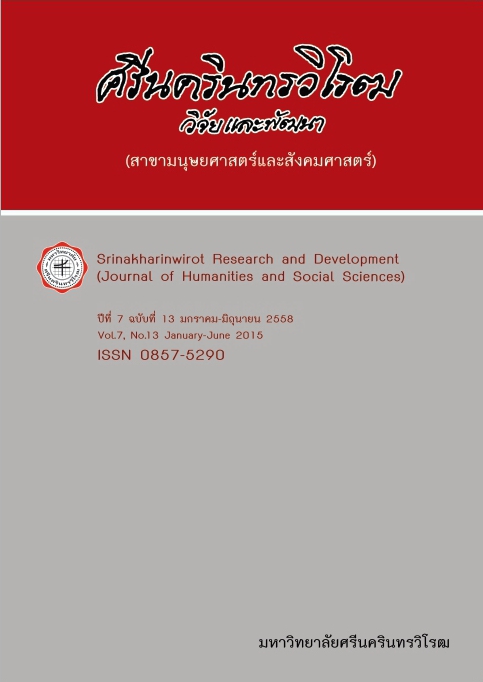การพัฒนารูปแบบที่เหมาะสมในการจัดการเรียนรู้จริยธรรมเชิงบูรณาการ ของมหาวิทยาลัยเทคโนโลยีราชมงคลล้านนา DEVELOPING AN APPROPRIATE MODEL OF THE INTEGRATED MORAL LEARNING AT RAJAMANGALA UNIVERSITY OF TECHNOLOGY LANNA
Keywords:
รูปแบบการจัดการเรียนรู้ การจัดการเรียนรู้จริยธรรมเชิงบูรณาการ รายวิชาการพัฒนาคุณภาพ ชีวิตและสังคมAbstract
บทคัดย่อ
การพัฒนารูปแบบการจัดการเรียนรู้จริยธรรมเชิงบูรณาการของมหาวิทยาลัยเทคโนโลยีราชมงคลล้านนาครั้งนี้ เป็นการพัฒนารูปแบบการจัดการเรียนการสอนจริยธรรมเชิงบูรณาการให้มีประสิทธิผลสำหรับผู้เรียนระดับอุดมศึกษา มีวัตถุประสงค์เพื่อพัฒนารูปแบบการจัดการเรียนรู้จริยธรรมเชิงบูรณาการที่เหมาะสมของมหาวิทยาลัยเทคโนโลยีราชมงคลล้านนา โดยเก็บข้อมูลจากการประชุมระดมความคิดเห็นและการสอบถาม ผู้บริหาร จำนวน 12 คน ผู้สอนระดับปริญญาตรีของมหาวิทยาลัยเทคโนโลยีราชมงคลล้านนา จำนวน 18 คน และใช้เทคนิคเดลฟาย ในการเก็บรวบรวมข้อมูลกับผู้เชี่ยวชาญ จำนวน 17 คน และทดลองใช้ชุดการเรียนการสอนจริยธรรมเชิงบูรณาการกับนักศึกษาระดับปริญญาตรีชั้นปีที่ 1 ของมหาวิทยาลัยเทคโนโลยีราชมงคลล้านนาภาคพายัพ ที่ลงทะเบียนเรียนวิชา การพัฒนาคุณภาพชีวิตและสังคม ในภาคเรียนที่ 1 ปีการศึกษา 2554 โดยการสุ่มให้ ห้องเรียนที่ 1 เป็นกลุ่มทดลอง ได้แก่ นักศึกษาสาขาวิชาการบัญชีจำนวน 31 คน และห้องเรียนที่ 2 เป็นกลุ่มควบคุม ได้แก่ นักศึกษาสาขาวิชาการตลาดจำนวน 38 คนรวมจำนวนทั้งสิ้น 69 คน เครื่องมือที่ใช้ในการศึกษาประกอบด้วย แบบสอบถามเกี่ยวกับรูปแบบและแนวทางการจัดการเรียนรู้จริยธรรมที่มีประสิทธิผลสำหรับผู้เรียนระดับอุดมศึกษา แบบสอบถามความเหมาะสมของรูปแบบการจัดการเรียนรู้จริยธรรมเชิงบูรณาการ ชุดการเรียนการสอนจริยธรรมเชิงบูรณาการในรายวิชาการพัฒนาคุณภาพชีวิตและสังคม และแบบวัดค่านิยมทางจริยธรรม การวิเคราะห์ข้อมูลใช้วิธีการวิเคราะห์เนื้อหา และการวิเคราะห์หาค่าร้อยละ ค่าเฉลี่ย ส่วนเบี่ยงเบนมาตรฐาน ค่ามัธยฐาน ค่าพิสัยระหว่างควอไทล์ และการทดสอบค่าที
ผลการวิจัยพบว่า รูปแบบการจัดการเรียนรู้จริยธรรมเชิงบูรณาการที่เหมาะสมของมหาวิทยาลัยเทคโนโลยีราชมงคลล้านนานั้น ผู้เรียนควรได้รับการสร้างเสริมจริยธรรมเชิงบูรณาการในรายวิชาการพัฒนาคุณภาพชีวิตและสังคม โดยจัดการเรียนรู้แบบเสริมสร้างเจตคติและปัญญาที่มีการบูรณาการจริยธรรมในด้าน ความเมตตากรุณา ความซื่อสัตย์สุจริต ความขยันหมั่นเพียร การใช้เหตุผลเชิงจริยธรรม และการใช้ปัญญาในการแก้ปัญหา และมีกระบวนการจัดการเรียนการสอน 3 ระยะ ได้แก่ ระยะก่อนทดลองสอน ระยะทดลองสอน และระยะติดตามผล โดยผู้เชี่ยวชาญมีความคิดเห็นสอดคล้องกันว่า รูปแบบการจัดการเรียนรู้จริยธรรมเชิงบูรณาการในรายวิชาการพัฒนาคุณภาพชีวิตและสังคมโดยรวมทุกด้าน มีความเหมาะสมอยู่ในระดับมาก นอกจากนี้พบว่า หลังจากใช้ชุดการเรียนการสอนจริยธรรมฯ ผู้เรียนกลุ่มทดลองมีค่าเฉลี่ยของคะแนนค่านิยมทางจริยธรรมด้านความเมตตากรุณา ความซื่อสัตย์สุจริต ความขยันหมั่นเพียร การใช้เหตุผลเชิงจริยธรรม และการใช้ปัญญาในการแก้ปัญหาสูงขึ้น และนักศึกษากลุ่มทดลองมีค่าเฉลี่ยของคะแนนค่านิยมทางจริยธรรมในภาพรวมสูงกว่ากลุ่มควบคุมอย่างมีนัยสำคัญทางสถิติที่ระดับ 0.01
Abstract
This study was a guideline for developing the effective model of integrated moral learning for undergraduate students. The study was aimed to develop an appropriate model of the integrated moral learning at Rajamangala University of Technology Lanna. The data were collected from brainstorming and asking 12 administrators and 18 lecturers of Rajamangala University of Technology Lanna. The Delphi technique was applied to collect the data by 17 experts. The samples including 31 students in experimental group and 38 students in controlled group taking Quality of Life and Society Course at Rajamangala University of Technology Lanna, Chiang Mai were tried out in the first semester of the 2011 academic year. The research instruments included questionnaire about guidelines for developing moral learning module and questionnaire about the appropriation of the moral learning model, moral instructional module integrated in Quality of Life and Society Course and moral value assessment forms. The collected data were analyzed by content analysis and by computer for percentage, mean, standard deviation, median, interquartile range, and t-test.
The results of the study showed that the appropriate model of the integrated moral learning at Rajamangala University of Technology Lanna was based on enhancing attitude and intelligence model. It was designed to support the students’ moral consisting of 5 aspects: 1) kindness 2) honesty 3) diligence 4) moral reasoning and 5) solving intelligence. The process of the moral instructional activity was divided into 3 phrases; baseline, treatment and follow up phrase. In addition, the appropriation of the moral learning model integrated in Quality of Life and Society Course , the experts indicated the overall factors are appropriate at high level. Moreover, the 5 aspects of moral value of the students’ in the experimental group were increased. Besides, the overall moral values of the students in the experimental group after using the moral instructional module were higher than those of the controlled group significantly at 0.01 level.
Downloads
Downloads
Published
How to Cite
Issue
Section
License
Srinakharinwirot Research and Development Journal of Humanities and Social Sciences is licensed Under a Creative Commons Attribution-NonCommercial-NoDerivs 4.0 International (CC-BY-NC-ND 4.0) License, Unless Otherwise Stated. Please Read Journal Policies Page for More Information on Open Access, Copyright and Permissions.



